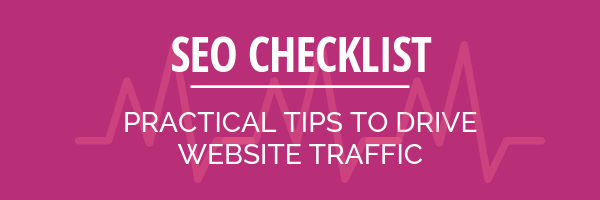This is the second part of a two-part series on SEO written by Joe Robison at Green Flag Digital. Read up on the first section here.
Link building continues to be one of the biggest challenges for most business websites and even those with sophisticated SEO teams struggle with it.
Even though Google downplays the importance of backlinks, it’s been at the core of their algorithm since 1996. And while there are many more factors that affect organic traffic now than in the early days, links have been proven again and again to be as important as ever in 2019.
Link building: Be wary of paid guest posts
Here's where I call out the travel industry: It’s flooded with the problem of link buying.
While there’s nothing ethically wrong with it, it is against Google’s terms of service. So the takeaway here is that the practice is risky and if you choose to do so, it shouldn’t be the only method of link acquisition.
Google has told us forever not to buy links and that they can detect them. It’s very hard to avoid this in the travel industry. Of all industries, the travel and personal finance industries are probably the most difficult to build natural links in.
In fact, an Ahrefs study shows that the travel industry has a hugely disproportionate difference compared to other industries:
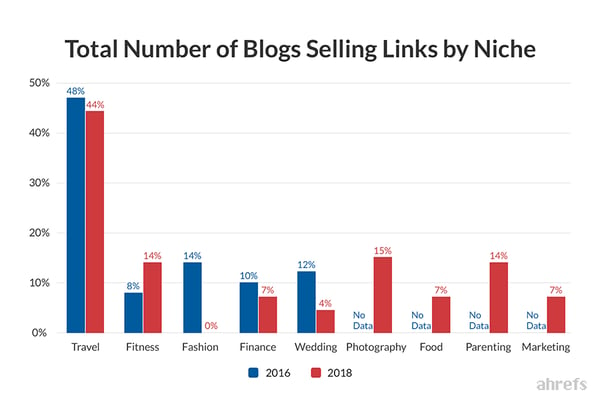
From my experience doing outreach, a majority of travel blogs that you’ll pitch to to write a guest post as a tour operator will be met with a request for payment. It’s frustrating because you’re both writing a free article for the travel blog, and having to pay. It’s understandable as travel bloggers don’t have many ways to monetize their sites besides sponsored posts, ads, and affiliate links.
So while Google can currently detect only a percentage of paid placement links, they are getting better all the time and have a goal of sniffing these out.
In practice, you’ll often see language like this when the blog requires payment:
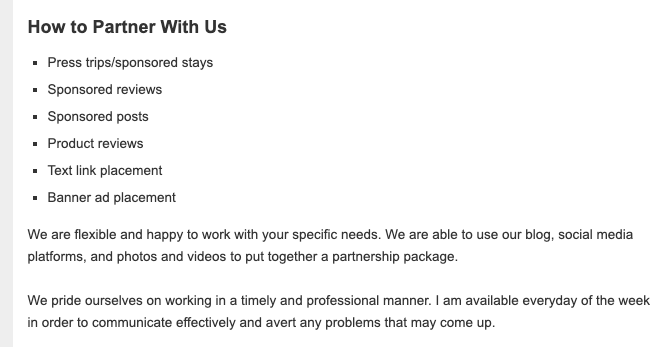
Even if Google isn’t necessarily identifying paid guest post links on a site, you should be wary if a website frequently links commercial keywords to third party sites. From experience, I can pretty quickly sniff out paid links when I see a site link out with a random anchor text like this:

And it’s within the realm of possibility to assume that Google can detect this pattern. It’s a tough scenario, and takes some advanced identification, but something to keep in mind when you’re building and buying link building services.
Key Takeaway
There’s no doubt, huge cruise lines, hotels, and deep pocketed travel companies are flying out writers for travel magazines to get some press and indirectly links to their site, so it’s a tough gray area.
As a word of caution, diversify your backlink profile and don’t rely solely on sponsored guest posts (that aren’t labeled) on travel blogs, as these might come back to bite you.
Build links with content promotion campaigns
Now that I’ve scared you a bit on the paid link building side of things, there's a light at the end of the tunnel.
The solution to natural link building? Stand out from the pack and create content that is perfectly crafted to earn attention and links from high quality third party publishers and bloggers.
According to research by Fractl, “Content marketing that generates mainstream press is 2X as effective as originally thought. Additionally, the long-term ROI is potentially many times higher than previously reported.”
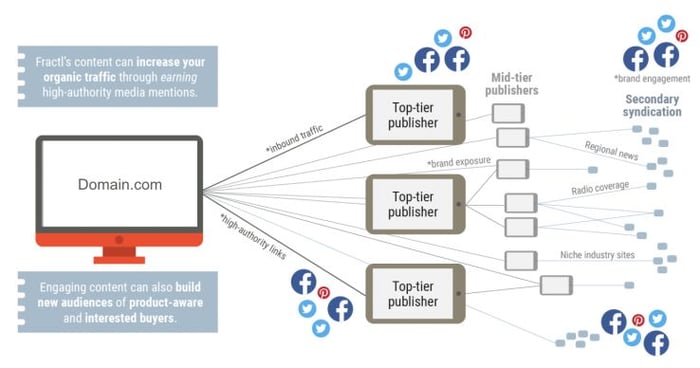
In a nutshell, content marketing campaigns for link building involve creating linkable content that publishers want to publish.
Want is the keyword here. By identifying publishers in certain verticals that enjoy and rely on sharing third party content, the success in your campaign increases greatly.
While not every campaign is a resounding success, over time these campaigns average a very efficient link count compared to other methods.
For example, I collaborated with a site to build this “Around the World in Perfect Weather” map:
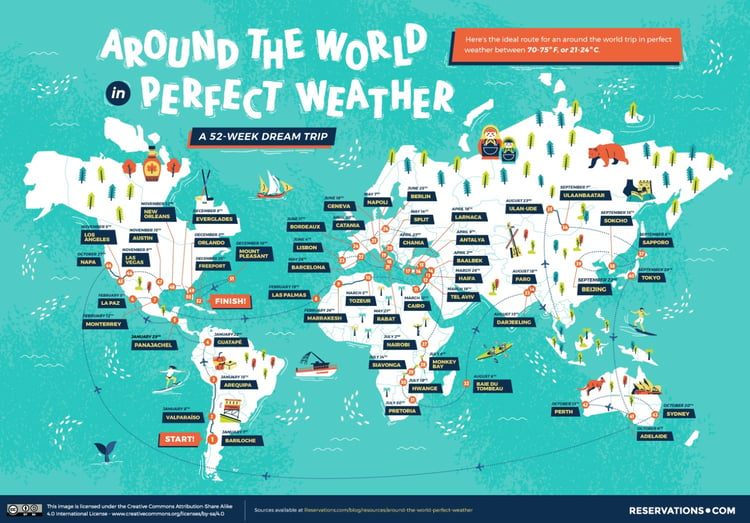
It was a painstaking amount of research, writing, and design - probably 70+ hours - but we’re seeing some great results and have been featured on high quality publications.
How would you do this on your own? Using tools such as Ahrefs or Moz, you want to identify content on your competitors’ websites that have earned the most links. Then, research and build different content in a similar format, or borrow that same content and present it in a new format. If a competitor creates a French wine map as a static visual, take that one step further and make it fully interactive.
Key Takeaway
Since the travel industry is notoriously difficult to get links from travel bloggers, even for high quality linkable assets, a next-level strategy is to identify verticals that love to link out such as the business space, productivity, food bloggers, etc. Find overlapping audiences that still make sense for your business, connect with them, and build those relationships.
There are link building techniques that work, it’s just about aligning win-win-win scenarios for everyone, and always think: “What’s in it for them?”
Putting it all together
Effective SEO takes a lot of time, energy, and dedication to see results that often take 6 to-12 months to bear fruit. For tour and activity operators that are offer services on small and local level, your goal could be to rank #1 for a small amount of high-value keywords that drive business - that’s when you’ll know your work is done.
For larger operators, with national and international ambitions, SEO is truly a never-ending activity if you have strong competition in your sphere. However, with the right strategies and team, organic traffic can become your most dependable and high ROI channel to grow your tour or activity business.
Missed the first part of the article? Read it here.
Want to get started? Download our free checklist.

